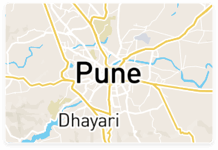Estimated Fees in India
₹ 500 to ₹ 800 per hour
Find Special Education (Learning Disabilities) Classes Fees in your locality
Post your Learning Need
Get customized quotes and responses from Tutors
Choose & Learn from Tutor of your choice

₹ 500 to ₹ 800

₹ 500 to ₹ 900

₹ 700 to ₹ 900

₹ 600 to ₹ 800

₹ 400 to ₹ 900

₹ 500 to ₹ 600
Lesson Posted on 11/11/2016 Learn Special Education/Special Education (AD/HD)

Tintisha B.
A shadow teacher is an educational assistant who works directly with a single special needs child during...
It is absolutely essential for parents to look for special educators beyond their locality. What they need to find is somebody who would be willing to travel for the child. Also, parents need to understand that the teacher will dedicate a good amount of hours to the child, so they must not try to negociate the fees all the time. They have to understand that their service will come at a price.
read lessLesson Posted on 03 Apr Learn Special Education/Special Education (AD/HD)
Tom's Park Adventure: A Day of Fun with Friends and a Red Ball

Raj Kumar
Experienced Special Educator with Expertise in Multiple Areas : As a special educator with 10 years...
Tom's Park Adventure: A Day of Fun with Friends and a Red Ball
Tom has a red ball. He likes to play with it in the park. Today, he will go to the park with his friends and have fun playing games with his ball under the sunny sky.
Questions
1. What color is Tom's ball?
2. Where does Tom like to play with his ball?
3. What will Tom do today with his friends?
4. What type of weather is it in the park today?
5. Who does Tom like to play games with in the park?
6. What activity does Tom enjoy with his ball in the park?
Fill in the Blanks:
1. Tom ________ a red ball.
2. Tom likes to play with his ball in the ________.
3. Today, Tom will go to the park with his ________.
4. Tom will have fun playing games with his ball under the ________ sky.
5. Tom's ball is the color ________.
6. Tom enjoys playing games with his ________ in the park.
Multiple Choice Questions:
1. What color is Tom's ball?
a) Blue
b) Red
c) Green
d) Yellow
2. Where does Tom like to play with his ball?
a) School
b) Park
c) Home
d) Library
3. What will Tom do today with his friends?
a) Watch TV
b) Play video games
c) Go to the park
d) Study at the library
4. What type of weather is it in the park today?
a) Snowy
b) Rainy
c) Sunny
d) Cloudy
5. Who does Tom like to play games with in the park?
a) His grandparents
b) His classmates
c) His friends
d) His siblings
6. What activity does Tom enjoy with his ball in the park?
a) Reading
b) Drawing
c) Playing games
d) Sleeping
read lessAnswered on 18 Jan Learn Special Education/Special Education (Learning Disabilities)

Sadika
The transition to adulthood can present unique challenges for students with learning disabilities (LD). It's essential to recognize that individuals with LD possess diverse strengths and abilities, and their experiences during this transition period can vary. Here are some considerations and strategies for LD students as they navigate the transition to adulthood:
Self-Advocacy:
Transition Planning:
Explore Career Options:
Skill Development:
Post-Secondary Education:
Job Readiness Programs:
Utilize Technology:
Transition Services and Agencies:
Networking and Mentoring:
Independent Living Skills:
Accessing Support Services:
Family and Community Involvement:
Emotional and Social Support:
Encourage Goal Setting:
Continued Advocacy:
It's important to approach the transition to adulthood for LD students with a strengths-based perspective, recognizing the unique talents and capabilities they bring to various settings. Customized support, ongoing communication, and collaboration among educators, families, and community resources contribute to a successful transition experience.
Have a question about Special Education (Learning Disabilities) Classes Fees? Ask your question and get answers from top Tutors.
Create your FREE UrbanPro profile and grow your income!
Find best tutors for Special Education (Learning Disabilities) Classes by posting a requirement.

Get started now, by booking a Free Demo Class